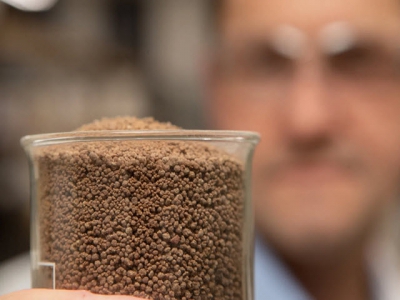FeedKind shown to protect shrimp against EMS

New scientific studies show shrimp fed diets containing Calysta’s FeedKind protein have a significantly lower risk of contracting early mortality syndrome (EMS).
FeedKind is made from single-cell organisms. Photo: Calysta
EMS is one of the biggest issues facing shrimp farming today, having cost the industry billions of dollars since it was first identified in Asia in 2009.
But a new study on the effectiveness of Calysta’s single-cell protein as a shrimp feed ingredient by Kasetsart University has shown a significant improvement in shrimp immune response to the disease – with survival rates of up to 100 percent after 15 days exposure, compared to just 76.7 percent of those fed on a traditional fishmeal-based feed.
FeedKind protein is a family of natural, sustainable and traceable feed ingredients for fish, livestock and pets, produced by fermenting natural gas with a naturally occurring bacteria. It uses no arable land and little water in its production, supporting global food security and helping feed an increasing population in a sustainable way.
Allan LeBlanc, vice-president and aquaculture lead at Calysta*, said: “Outbreaks of disease remain one of the biggest challenges in aquaculture today. EMS in particular has caused more than $20 billion in losses to the shrimp industry over the last decade, and disease management and prevention is one of the industry’s highest priorities.
“FeedKind’s ability to activate shrimps’ innate immune system could be transformative for the industry. As a key ingredient in functional feeds, it can form the backbone of a comprehensive disease prevention strategy for farmers, all while improving animal health and increasing yield.
“With a growing global population and increasing demand for protein, being able to produce more food from less is absolutely crucial to helping us maximize existing resources and improve global food security.”
The research - plus other cutting-edge, non-medicinal means of tackling major shrimp disease - will be discussed in more detail in a webinar organised by Calysta and The Fish Site on 10 November.
The results of the new trial on the effectiveness of Calysta’s single cell protein feed in farmed shrimp also show FeedKind-based feeds are just as effective in promoting growth and survival in shrimp compared to traditional fishmeal-based feeds.
The study, carried out by Dr Orapint at the nutrition and aquafeed laboratory, department of aquaculture, faculty of fisheries, Kasetsart University, Bangkok, Thailand, has been published today in the journal, Frontiers in Marine Science.
The study said: “FeedKind does not inhibit growth performance, feed efficiency, or survival of shrimp. Additionally, shrimp in this study demonstrated an increased tolerance to disease when challenged with Vibrio, indicating FeedKind protein may help promote a robust immune response.”
Since its discovery in 2009, EMS has wreaked havoc in Asian aquaculture markets. In China, output was reduced by up to 80 percent in some regions, while Thailand reported $11.5 billion in losses due to the disease between 2010-16. Vietnam had similar issues, citing losses of more than $2.5 billion.
The FeedKind study saw Penaeus vannamei shrimp fed a variety of diets, from a control diet comprised of traditional fishmeal-based feed, to diets with increasing quantities of FeedKind protein to replace the fishmeal; at 33 percent, 66 percent and 100 percent - up to a total of 15 percent of feed.
The shrimp then spent 15 days continuously exposed to the causative agent of EMS, Vibrio parahaemolyticus. All shrimp on the FeedKind-based diets showed greater survival rates compared to the fishmeal-based feed, from 76.7 percent in the control, to 86.7 percent at 5 percent FeedKind, 96.7 percent in 10 percent FeedKind and 100 percent in the 15 percent concentration of FeedKind.
The current study has shown that fishmeal can be entirely replaced in shrimp diets with FeedKind. Additionally, the replacement of fishmeal with methanotroph bacteria meal protein, FeedKind, followed by a natural V. parahaemolyticus challenge led to improved survival.
Calysta’s 50/50 joint venture with Adisseo, Calysseo, is in the process of building the world’s first FeedKind commercial production facility in Chongqing, China, with completion of the first 20,000 tonne per year plant expected next year and expansion shortly thereafter.
Related news
 Rice exports on the rise: three months in a row
Rice exports on the rise: three months in a row Making a steady comeback in July and August, rice exports in September continued to experience a sharp increase.
 Imports of raw cashew nut decreases in 2 continuous months
Imports of raw cashew nut decreases in 2 continuous months After a sharp rise in the beginning months of 2021, imports of raw cashew nut decreased continuously in recent months, especially from the Cambodian market.
 Using technology to improve water quality management in shrimp farming
Using technology to improve water quality management in shrimp farming Indonesian shrimp farmers now have access to – and would be wise to implement – a new range of easy, fast and precise water quality management systems.